2025 eCommerce Holiday Calendar + Free Template

Successful eCommerce businesses thrive on strategic planning. Have you prepared your 2025 marketing calendar to capitalize on key sales dates? A carefully curated approach to holiday promotions and marketing can transform an ordinary sales year into an extraordinary one.
Download our free marketing calendar template packed with all the essential dates and actionable tips to make 2025 your most profitable year yet.
- Pre-filled with major holidays and retail events.
- Customizable for specific business needs.
- Optimized for both digital and print use.
Download Your FREE 2025 eCommerce Holiday Calendar
Pick Your Month:
January 2025
February 2025
March 2025
April 2025
May 2025
June 2025
July 2025
August 2025
September 2025
October 2025
November 2025
December 2025
The Ultimate 2025 eCommerce Dates to Know
Use this detailed guide to plan your campaigns month-by-month. Leverage these key dates to boost sales and connect with your audience effectively.
January 2025
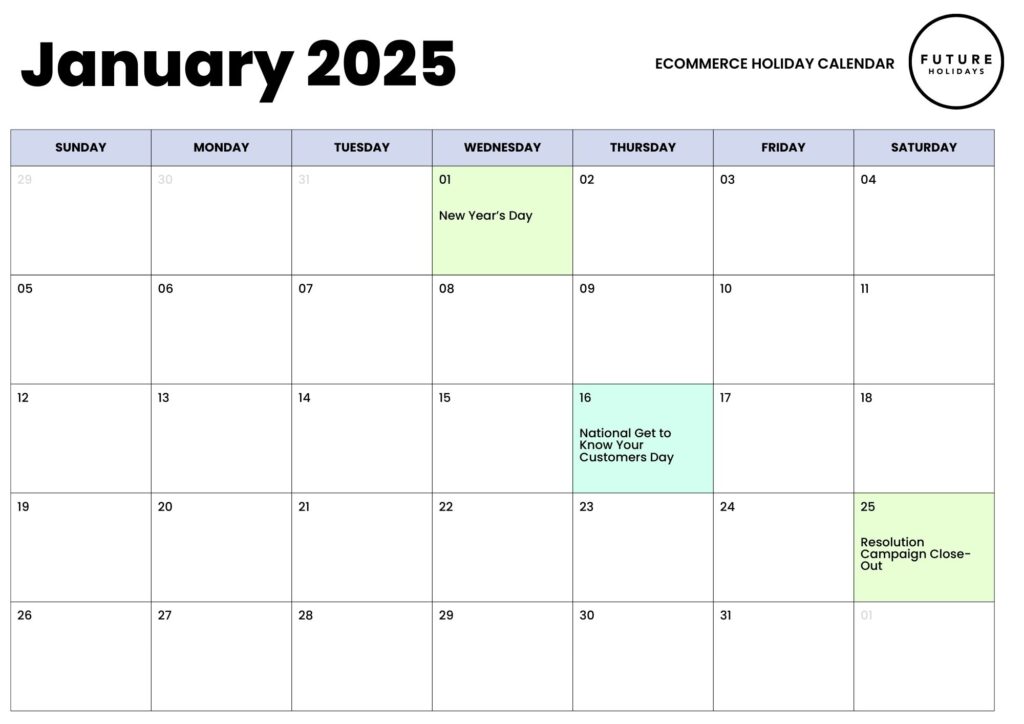
January 1: New Year’s Day
Capitalize on the New Year by promoting wellness, fitness, and productivity products under “New Year, New You” themes.
Launch campaigns that inspire audiences to achieve their goals with your products, using dynamic email recommendations based on past purchases. Incorporate countdown timers to instill urgency and boost conversions.
January 16: National Get to Know Your Customers Day
Use this day to connect with your audience and gather valuable insights. Conduct surveys, polls, or quizzes and offer rewards to participants, such as discounts or exclusive deals.
January 25: Resolution Campaign Close-Out
As January winds down, tap into the final days of New Year’s resolutions by offering exclusive discounts and deals.
Automate email campaigns reminding shoppers to stay on track with their goals and showcase products that align with resolution-driven habits like fitness, organization, or self-care.
Pro-Marketing Tips ⭐
- Use polls or surveys on Instagram Stories or email to increase engagement.
- Reward survey participants with a discount code or free shipping.
- Use insights from this day to refine your spring and summer campaigns.
February 2025
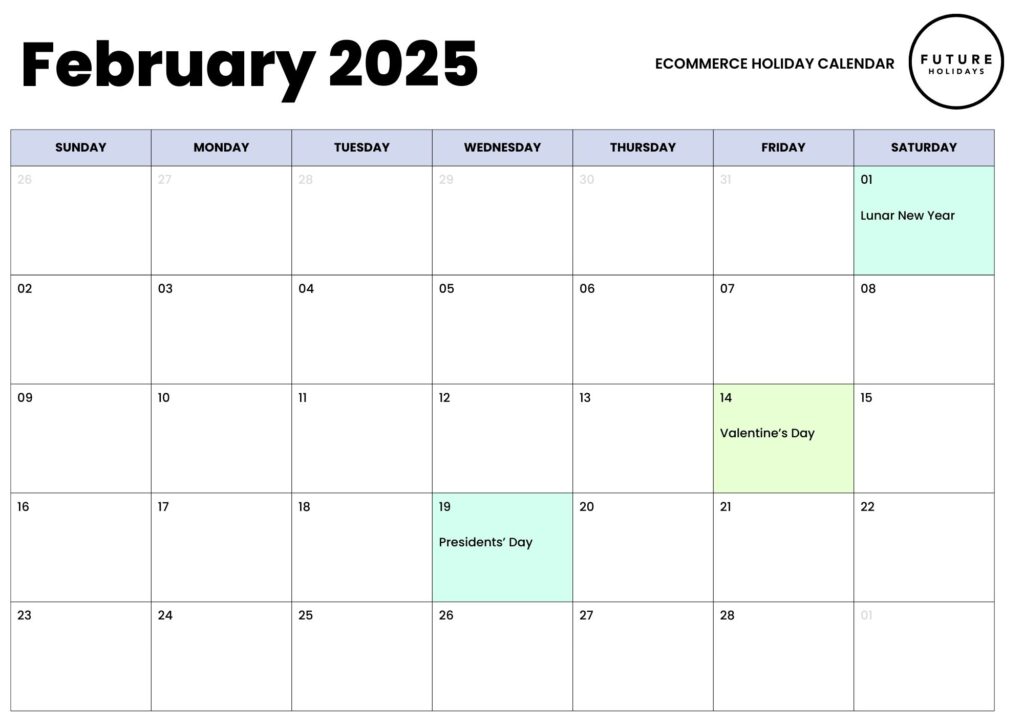
February 1: Lunar New Year
Celebrate this globally significant event by promoting themed products or hosting flash sales. Leverage festive visuals featuring red and gold hues to attract attention.
February 14: Valentine’s Day
Incorporate Valentine’s themes like red and pink visuals across your website and social platforms. Run early promotions starting in late January to accommodate shipping times.
February 19: Presidents’ Day
Presidents’ Day combines patriotic pride with winter sales, making it ideal for promoting big-ticket items like appliances, furniture, or electronics.
Align your messaging with themes of leadership and national pride, and use patriotic imagery in ads to boost engagement.
Pro-Marketing Tips ⭐
- Offer discounts on gift-ready items and create Lunar New Year gift bundles.
- Collaborate with influencers in communities celebrating Lunar New Year.
- Use email campaigns with auspicious phrases or colors to attract shoppers.
March 2025
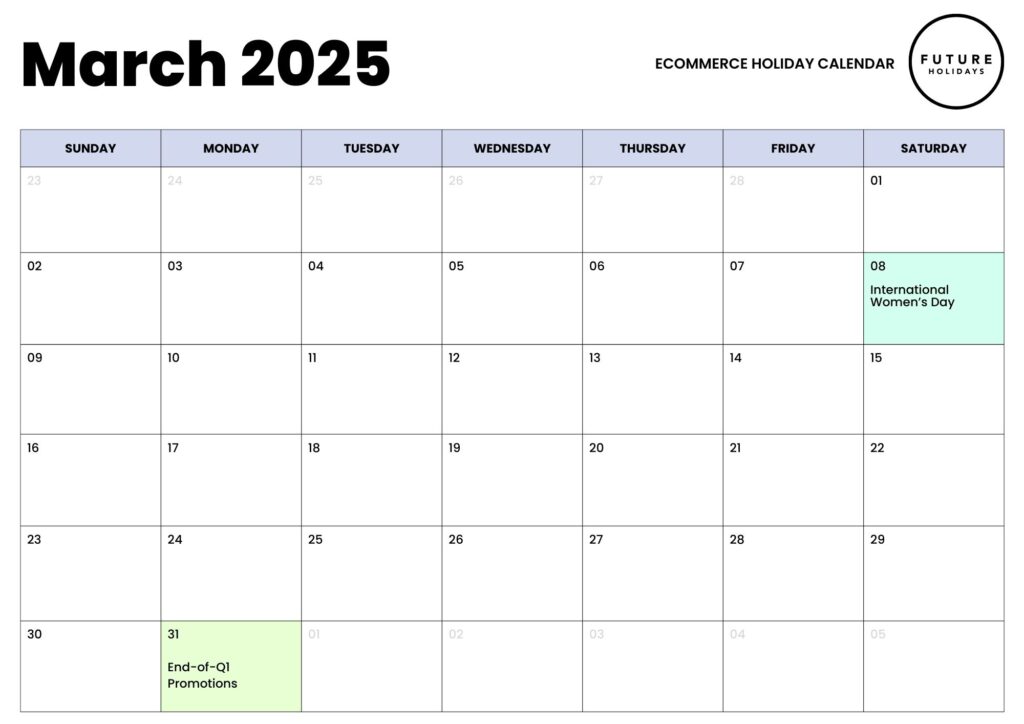
March 8: International Women’s Day
Celebrate women and their achievements with campaigns that spotlight women-owned businesses or products for women.
Consider partnering with female influencers or donating a portion of sales to women’s charities. Use authentic, empowering messaging to connect with socially conscious shoppers.
March 31: End-of-Q1 Promotions
Close the quarter strong with flash sales and early bird discounts on spring products.
Highlight seasonal transitions by promoting inventory clearances for winter stock and teasing upcoming releases for warmer weather. Use milestone-based marketing, such as sharing customer success stories from Q1.
Pro-Marketing Tips ⭐
- Highlight user-generated content featuring women entrepreneurs for Women’s Day campaigns.
- Offer exclusive loyalty rewards for end-of-quarter milestones.
- Use analytics to determine which products performed well in Q1 and promote complementary items.
April 2025
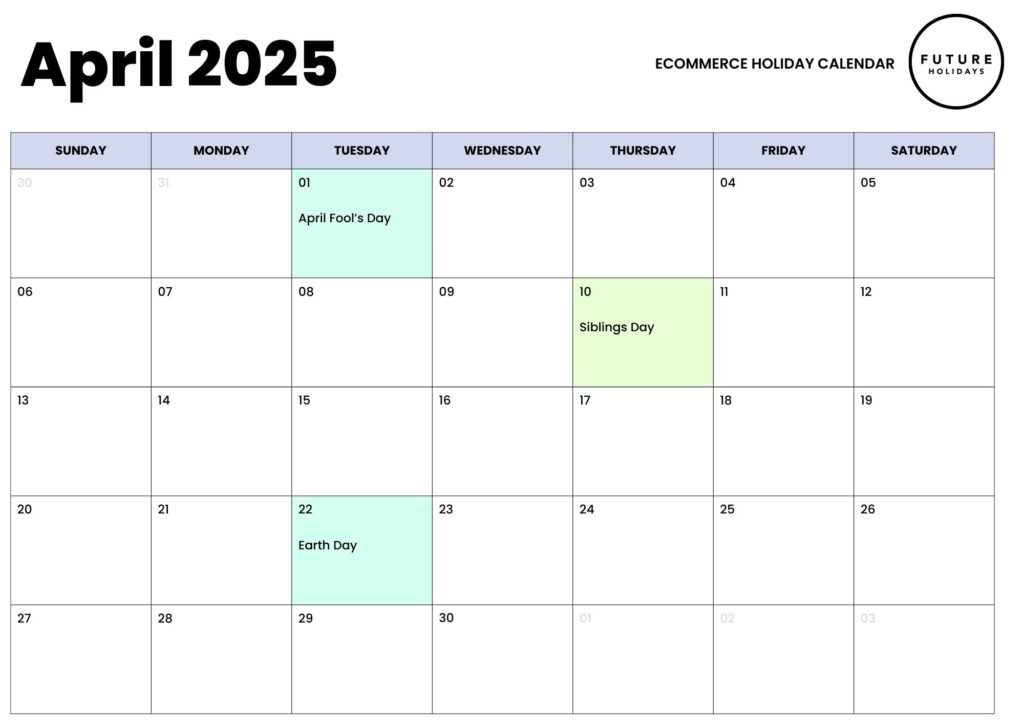
April 1: April Fool’s Day
Engage audiences with lighthearted and playful campaigns that include “fake” product launches or humorous discounts.
Once you capture attention, redirect shoppers to your real offers or use this day to introduce surprise flash sales. Keep the tone fun and on-brand to avoid confusion.
April 10: Siblings Day
Promote quirky, sentimental, or humorous gifts tailored for siblings. Highlight budget-friendly options and gift bundles that appeal to both younger and older shoppers.
April 22: Earth Day
Build on your brand’s sustainability efforts by highlighting eco-friendly products or green initiatives. Showcase your use of sustainable materials or pledge donations to environmental causes.
Use storytelling to emphasize your commitment to the planet, making an emotional connection with your audience.
Pro-Marketing Tips ⭐
- Incorporate gamification into Earth Day campaigns, like rewarding customers for recycling or eco-friendly actions.
- Collaborate with green organizations for co-branded initiatives.
- Create limited-edition Earth Day packaging to appeal to environmentally conscious shoppers.
May 2025
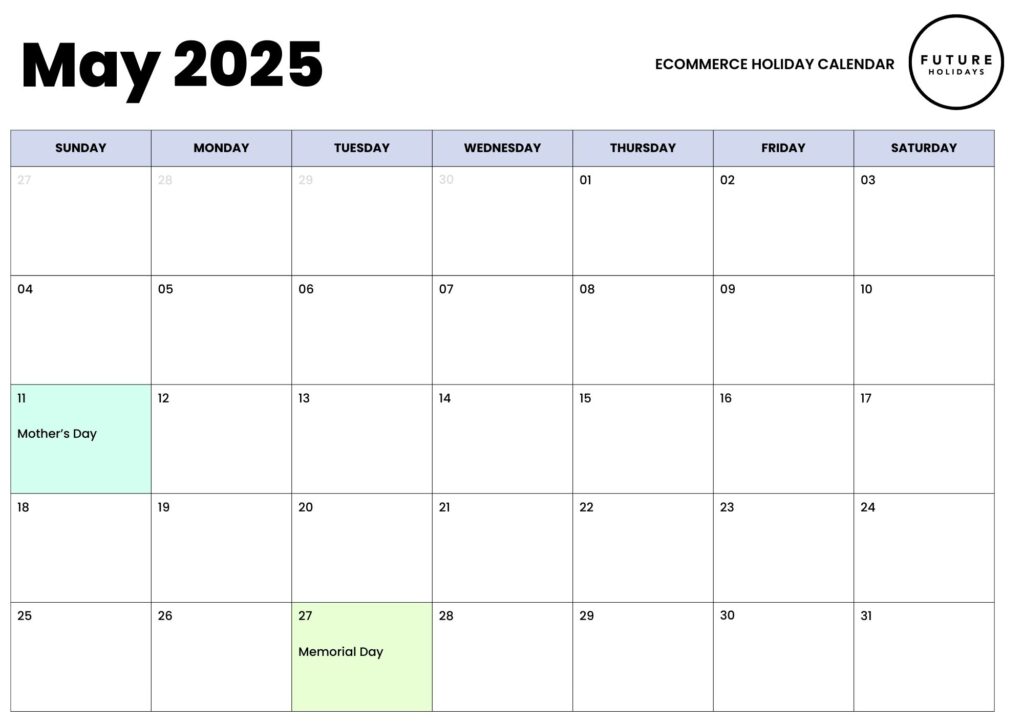
May 11: Mother’s Day
Refresh your Mother’s Day bundles by introducing exclusive gift sets or free personalization options.
Begin promotions in early April to encourage early orders and reduce shipping stress. Offer free gift wrapping and shipping thresholds to make gift-giving seamless.
May 27: Memorial Day
Memorial Day is the unofficial start of summer and a key opportunity to promote outdoor essentials like grills, patio furniture, or travel gear.
Use patriotic colors and imagery in your ads, and tie promotions to themes of gratitude and remembrance for military families.
Pro-Marketing Tips ⭐
- Use video testimonials to showcase customer experiences with Mother’s Day gifts.
- Highlight military or veteran-related initiatives for Memorial Day campaigns.
- Promote outdoor living bundles to align with summer kickoff themes.
June 2025
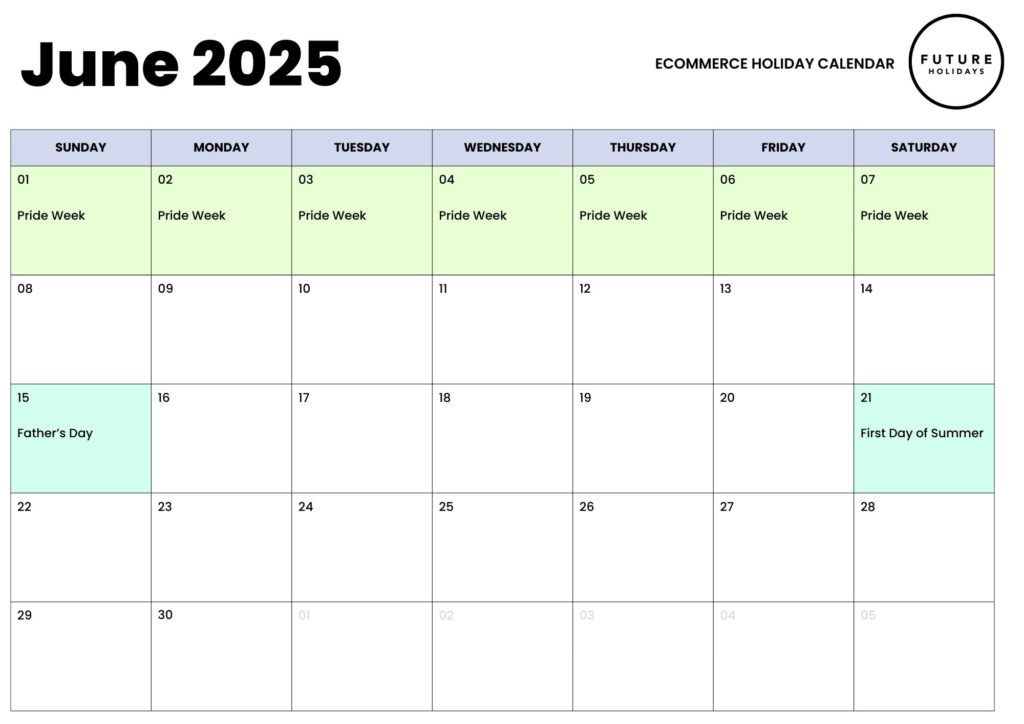
June 1–7: Pride Week
Show your brand’s support for the LGBTQ+ community by running Pride-themed campaigns. Highlight relevant products or pledge a percentage of sales to LGBTQ+ organizations.
June 15: Father’s Day
Focus on practical and hobby-driven gifts for dads, such as gadgets, tools, or BBQ kits. Create “Dad-approved” bundles with items like summer gear or tech accessories. Begin campaigns in mid-May to give shoppers time to plan their purchases.
June 21: First Day of Summer
Celebrate the season’s start with promotions on travel gear, swimwear, and other vacation-ready essentials. Pair campaigns with sunny, vibrant visuals to evoke a feeling of summer excitement and inspire purchases for upcoming vacations.
Pro-Marketing Tips ⭐
- Partner with travel bloggers or influencers to promote vacation-themed products.
- Run “Summer Essentials” campaigns featuring bestsellers for beach and outdoor activities.
- Offer free shipping thresholds to encourage larger cart sizes for summer bundles.
July 2025
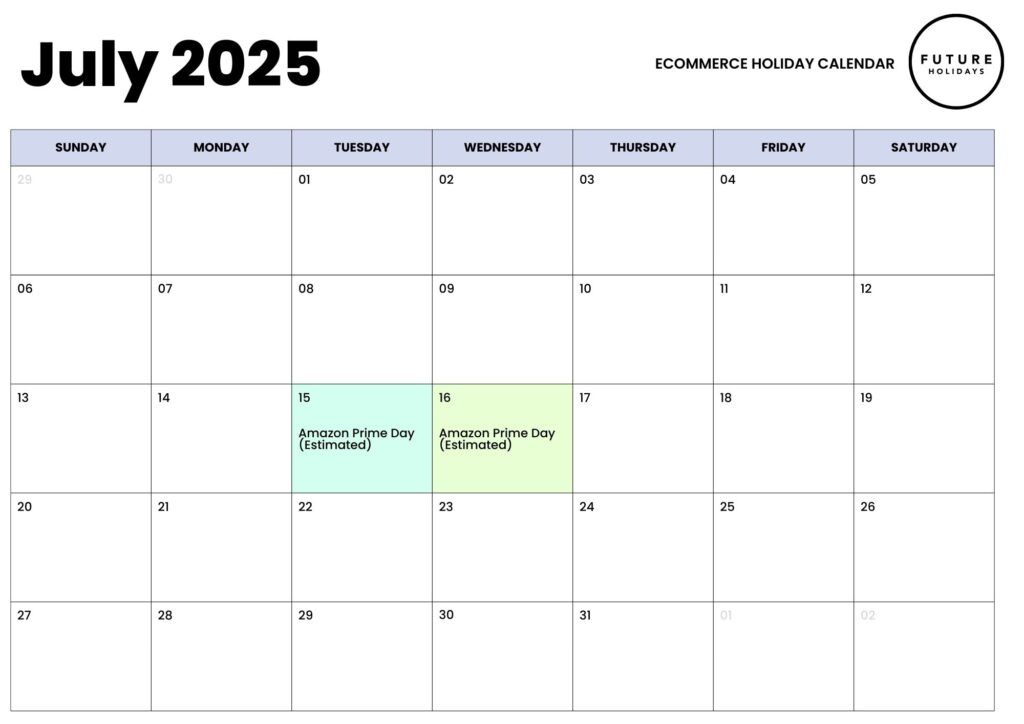
July 15–16: Amazon Prime Day (Estimated)
Compete with Amazon by offering exclusive discounts or bundles on popular items.
Launch teaser campaigns in early July to build anticipation, and use this opportunity to introduce loyalty program incentives like early access for VIP customers.
Pro-Marketing Tips ⭐
- Run a “Why Wait?” campaign with exclusive deals leading up to Prime Day.
- Use social media to create countdown posts building excitement for your discounts.
- Offer bonus loyalty points for purchases during your Prime Day sales.
August 2025
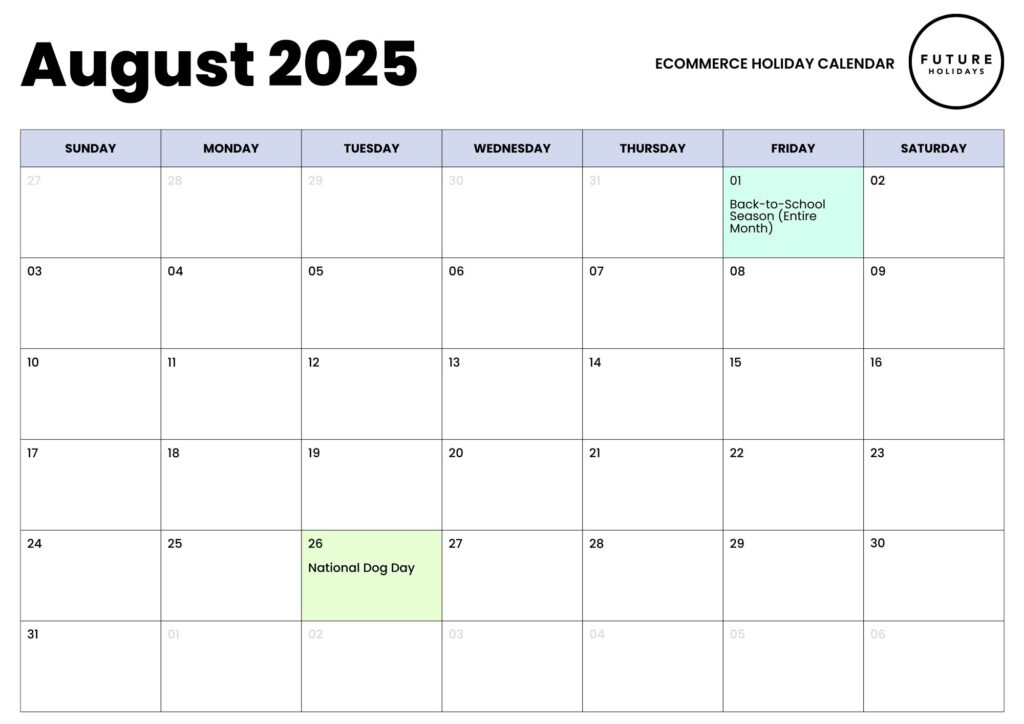
Back-to-School Season (Entire Month)
Leverage back-to-school shopping trends by offering discounts on supplies, electronics, and apparel. Create bundled deals tailored for students, parents, or teachers. Use targeted ads on social platforms like TikTok or Instagram to reach younger audiences.
August 26: National Dog Day
Offer promotions on pet products, pet-themed gifts, or services like grooming. Engage audiences on social media with a “Share Your Dog’s Best Look” contest.
Pro-Marketing Tips ⭐
- Partner with schools or educational influencers to boost credibility and reach.
- Provide additional discounts or freebies for educators to show appreciation.
- Promote subscription-based items like learning apps or educational supplies.
September 2025
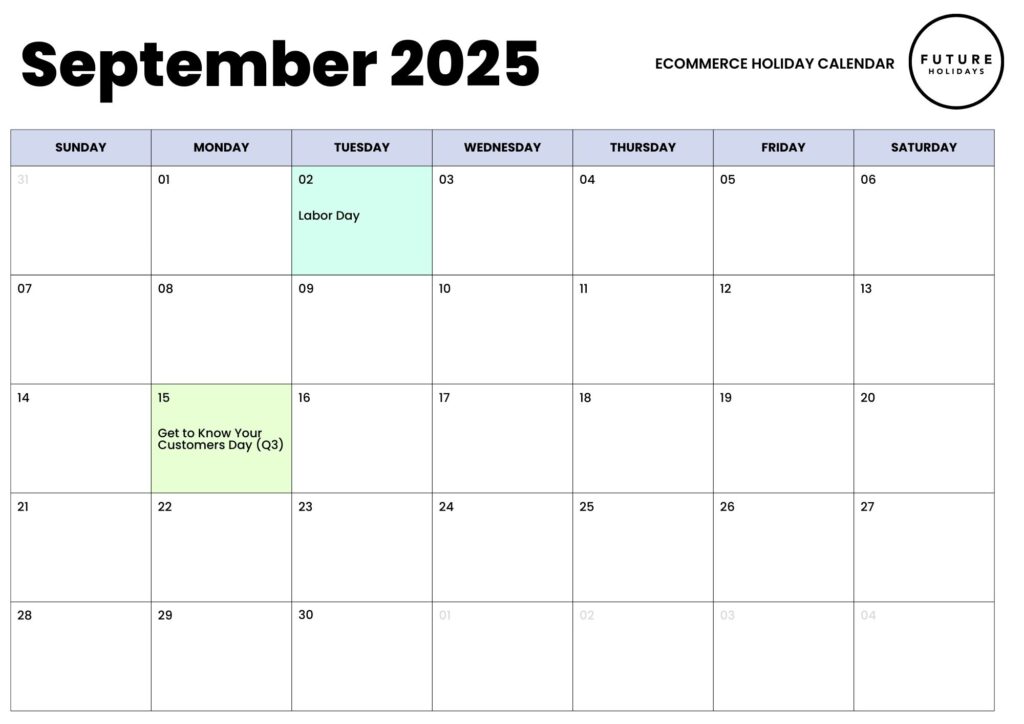
September 2: Labor Day
Labor Day marks the unofficial end of summer, making it an excellent opportunity for promoting outdoor items, home improvement products, and clearance sales.
Offer discounts on seasonal inventory like grills, patio furniture, and summer apparel to clear stock and prepare for fall promotions. Position campaigns with themes like “Last Days of Summer Savings” to create urgency.
September 15: Get to Know Your Customers Day (Q3)
This quarterly opportunity lets you deepen customer relationships through interactive initiatives. Run polls, quizzes, or live Q&A sessions to gather insights and strengthen brand loyalty. Reward participation with exclusive discounts or freebies.
Pro-Marketing Tips ⭐
- Create a “Goodbye Summer” sale featuring heavily discounted seasonal items to attract deal-seekers.
- Use customer survey results from Get to Know Your Customers Day to tailor upcoming fall and holiday promotions.
- Launch a referral program tied to Labor Day deals, encouraging customers to invite friends and earn rewards.
October 2025
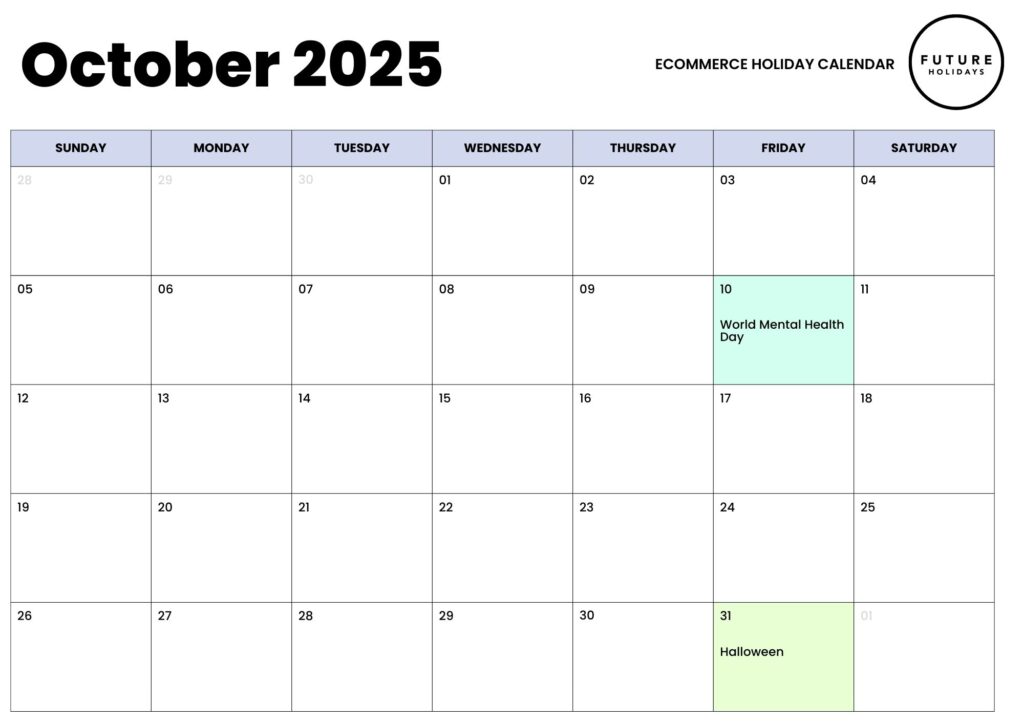
October 10: World Mental Health Day
Align your brand with mental wellness by promoting products such as journals, relaxation tools, or wellness services. Share informative content to build trust and connect with customers.
October 31: Halloween
Build on successful 2024 campaigns by introducing limited-edition Halloween-themed products or exclusive packaging. Run spooky-themed social media contests, such as costume competitions or “best-decorated space,” to engage audiences.
Create interactive campaigns to generate user-generated content.
Pro-Marketing Tips ⭐
- Use augmented reality (AR) features to let customers “try on” costumes or see Halloween-themed product applications.
- Offer early bird discounts for customers purchasing decorations or costumes in September.
- Collaborate with influencers to promote themed products, especially in the DIY or party planning spaces.
November 2025
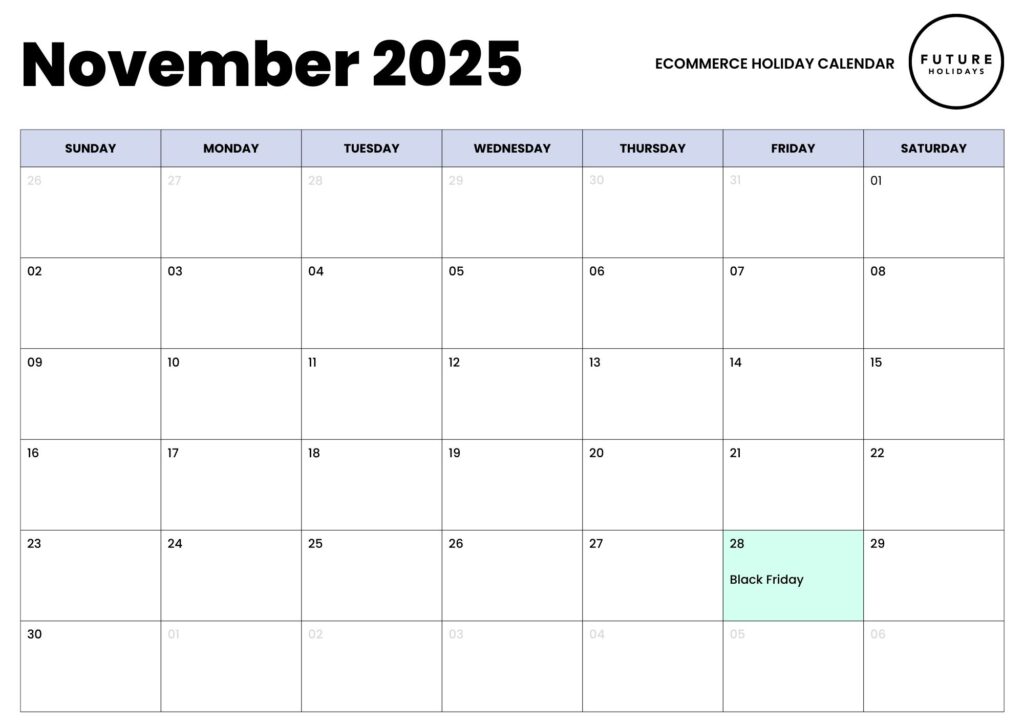
November 28: Black Friday
Update your most successful deals from 2024 with fresh incentives to draw in repeat customers. Launch staggered early-bird sales exclusively for email subscribers or loyalty program members. Use social proof like countdowns on sold-out items to drive urgency.
Pro-Marketing Tips ⭐
- Utilize geo-targeted ads to promote same-day pickup options at local stores.
- Focus on digital marketing channels like SMS and push notifications for instant reminders.
- Run exclusive discounts on digital gift cards for last-minute shoppers.
December 2025
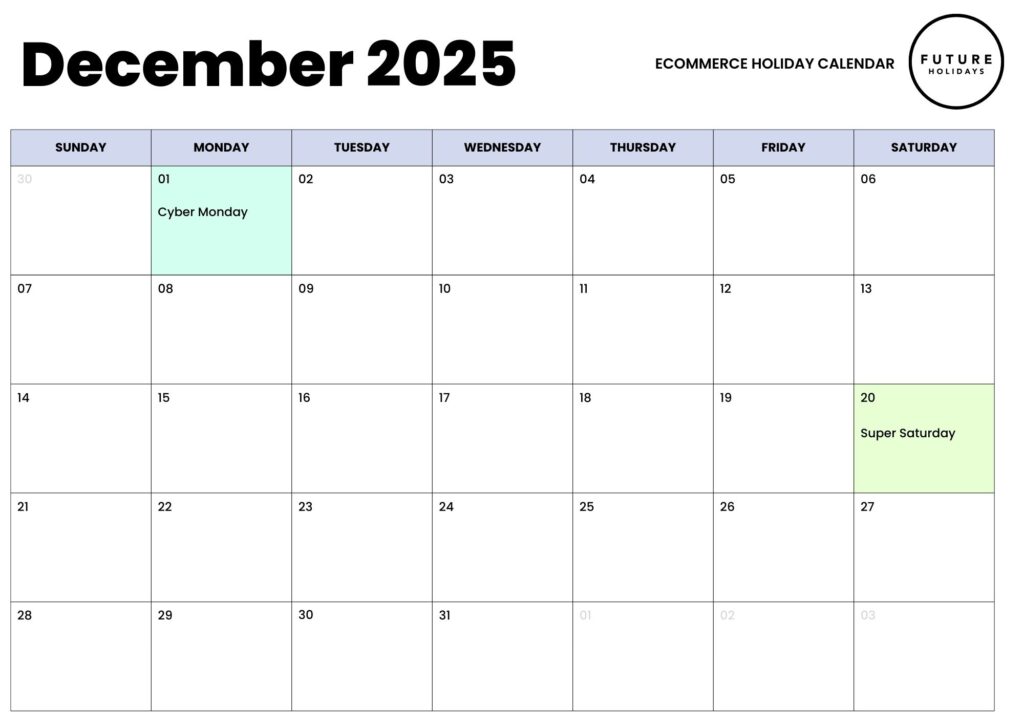
December 1: Cyber Monday
Focus on tech products, digital goods, and online-exclusive deals. Build upon your Black Friday efforts with targeted campaigns aimed at cart abandoners or undecided shoppers. Promote bundled offers for popular items to increase cart values.
December 20: Super Saturday
Expand your last-minute gifting options to include expedited shipping, in-store pickup, and digital gift cards. Use urgency-driven ads on social media and email to target procrastinating shoppers. Highlight convenience in your messaging with phrases like “Gift in Minutes” or “Order Now, Pickup Today.”
Pro-Marketing Tips ⭐
- Use predictive analytics to recommend complementary items for bundles or upselling.
- Incorporate live chat features to assist hesitant shoppers in real-time during Cyber Monday.
- Introduce special perks like free gift wrapping or extended return policies for early holiday shoppers.
Bonus: Beyond the Holidays
- Celebrate brand milestones.
Host anniversary sales or special events to reward loyal customers and create excitement. - Run flash sales to maintain momentum.
Surprise shoppers with limited-time offers between major holidays. - Collaborate with other brands.
Partner with complementary businesses for joint promotions that attract new audiences. - Promote loyalty programs.
Offer exclusive discounts or early access to VIP customers to keep them engaged year-round.
With a mix of holiday-focused and creative campaigns, you’ll keep your brand top-of-mind for customers all year.
Wrap-Up: Your Best Year Starts with Planning
Efficient planning turns potential into profit. With our free 2025 eCommerce holiday calendar, you’ll stay ahead of the competition and capture your audience’s attention at the right time.
Download your calendar today and take the first step toward a record-breaking sales year!
If you’re looking for additional support to elevate your campaigns, consider exploring our range of tailored eCommerce services designed to help your brand grow and thrive.

 Ryan Kodzik
Ryan Kodzik 
